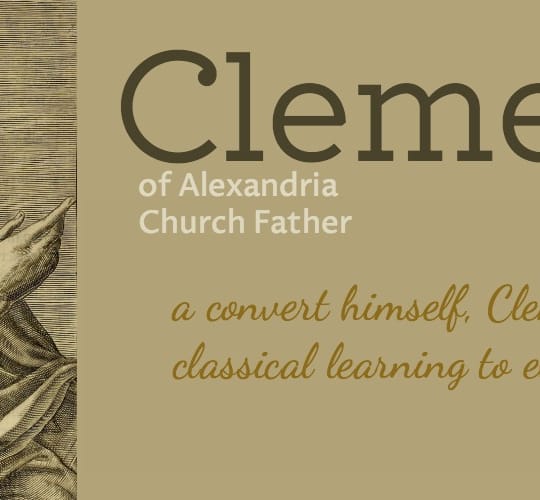
Why Classical? Why Pagan Philosophy?
Over the years I’ve had conversations with several people who just can’t seem to get beyond the term “classical” in education. “What hath Athens to do with Jerusalem?!” they exclaim – generally with more words and less pithily.

This is a question that has already been asked and answered, if we will listen and learn. Part of the spirit of classical education is respecting and seeking the knowledge and wisdom of the past.
The Great Tradition: Classical Readings on What It Means to Be an Educated Human Being is a collection of the writings about education from Plato to the modern era, the writings that have informed the development of western civilization and classical education.
CH073: All God’s Truth: Clement on Classical Christian Education
In this excellent book, I’ve read selections from the classical authors themselves and learned that many of the education issues we have today are not new at all – they are the same as those experienced for thousands of years. And now I’ve entered the Church Father period. Is there a clean break and a new approach? No. Rather, there is a sifting.
Truth is one. Error has countless ways of going astray. –Clement of Alexandria

Clement of Alexandria in the third century is one of the first to wrestle in writing with the question of the place of Greek philosophy in Christian education. And he has some pretty decent answers.
God used Greek philosophy to prepare the world for Christ
So, before the Lord’s coming, philosophy was an essential guide to righteousness for the Greeks. At the present time, it is a useful guide toward reverence for God.
For philosophy was to the Greek world what the Law was to the Hebrews, a tutor escorting them to Christ.
And, to those who ask for a Hebrew rather than a classical education, I want to know, historically: which group more readily accepted Christ? Which preparation was most effective? The book of Romans has quite a bit to say on that.
God is responsible for all good things: of some, like the blessings of the Old and New Covenants, directly; of others, like the riches of philosophy, indirectly. Perhaps philosophy too was a direct gift of God to the Greeks before the Lord extended his appeal to the Greeks.
Often, I believe, our understanding of the flow of history – of God’s purpose and direction in history from the beginning until Christ returns – gets in the way of our receiving the wisdom of the past. Will we learn from history? Or will we think we are something special and detached, a new thing and a new people, unrelated to the ancient or medieval world.
The classical tradition does not see itself as a new thing, but as part of the stream of Western civilization that started in Greece, grew in the middle ages, has suffered much recently, but still exists, particularly if we educate our children in its gifts and blessings and warnings. It is the culture of a people who sought truth, of a people then who met Truth, of a people who tried – though messily and often wrongly – to make truth the basis of their state and kingdoms, and always of a people who wanted truth more than anything else.
Anyone who brings every experience to bear on right action, taking models from Greeks and non-Greeks alike, is a highly skilled hunter of truth.
Today, people want to reject the very existence of truth. Classical education values truth, seeks it, and changes lives based on it.
So here I affirm that the expert is the one who brings everything to bear on the truth. He culls whatever is useful from mathematics, the fine arts, literary studies, and, of course, philosophy, and protects the faith from all attacks.
Appealing to several Proverbs about seeking wisdom, Clement advises us not to prefer simple faith over educated faith – faith first, but then comes learning. And, for some, it is the learning that will open the doors to the answer of faith – because philosophy, learning, is a search for truth. There is only one satisfying end point for such a search: true Truth.
Those who live by virtue emerge, not naturally but by education, like doctors or pilots.
Virtue takes practice. It takes cultivation of the natural, but dormant and undeveloped, possibilities. God does not zap us with holiness, but gives us means and time. Education is one such means. And education comes to us from the Greeks. It’s just a historical fact.
We may not say that righteousness appears simply by a divine dispensation.
We need divine revelation, and we need the discernment and wisdom to understand it. God reveals truth, but He does not zap us with instant holiness. In that we must grow intentionally over time and through discernment and learning.
But just as we say that it is possible to have faith without being literate, so we assert that it is not possible to understand the statements contained in the faith without study.
We must learn how to question and refute in order to know truth from false and learn to love the highest things – and the art of dialectic, of reasoning and knowing, was perfected by the Greeks.
Everything is illuminated when the true light rises.
However, Clement is not offering a blanket acceptance of everything that comes from Greek learning:
We do not regard philosophy as a sine qua non.
No, we do not learn truth directly from the Greeks, but we do learn how to reason, how to think, and how to persuade effectively.
Clarity contributes to the transmission of truth, dialectic to escaping from the attacks of the heresies.
Ultimately, however:
[Philosophy] is a search for truth.
If we want truth, we want philosophy – a love of wisdom.
The Savior’s teaching is sufficient without additional help, for it is the power and wisdom of God. The addition of Greek philosophy does not add more power to the truth; it reduces the power of the sophistic attack on it. It turns aside the treacherous assaults on truth, and is rightly called the wall of defense for the vine. Truth following faith is as essential to life as bread.
Clement also argues that if we take the skills and arts of the Greeks, use them without crediting or acknowledging that we have inherited them from others, we are robbers and liars. Instead of pretending they are our own discovery, we should take them with credit and gratitude.





